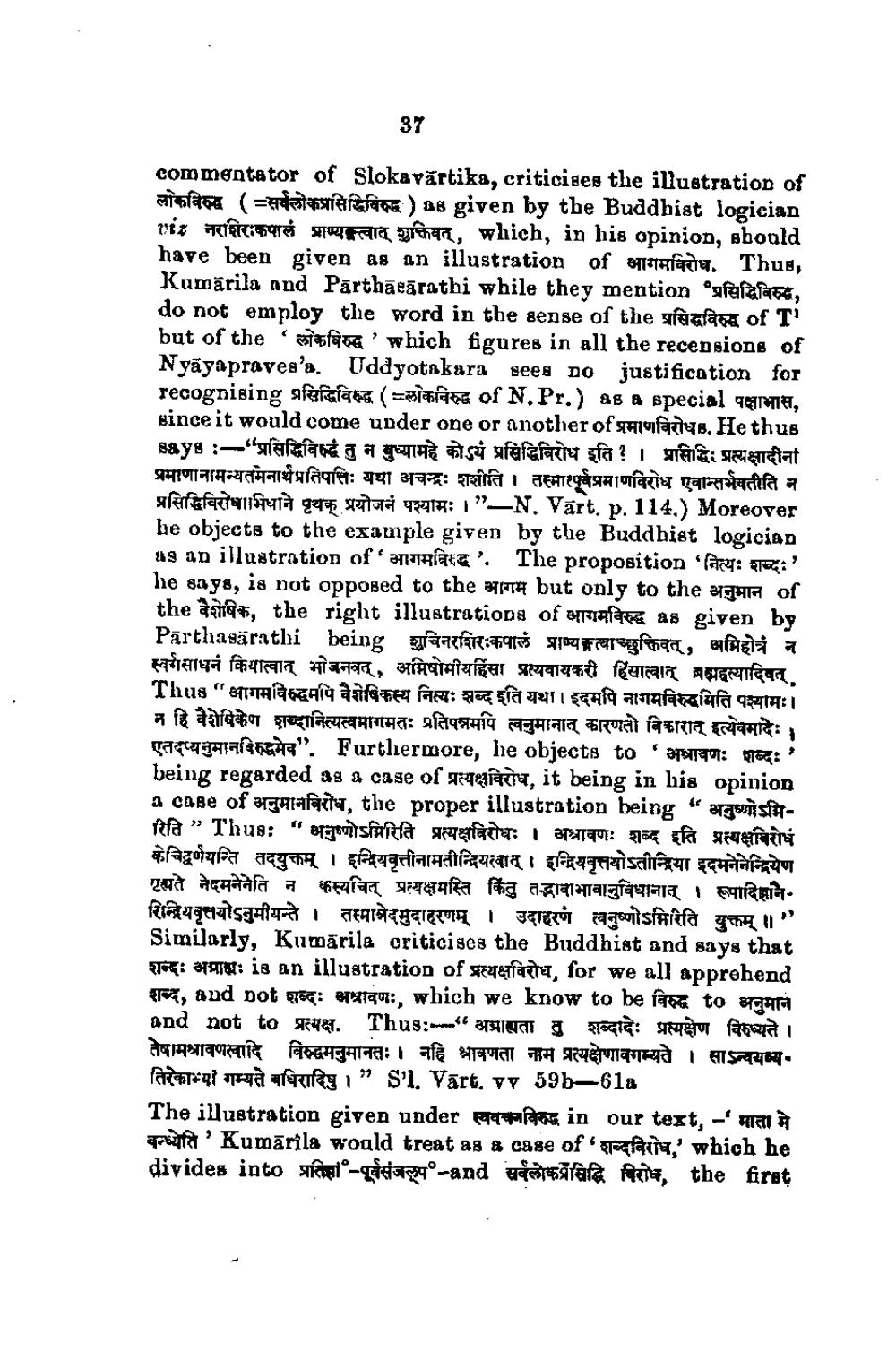________________
37
commentator of Slokavārtika, criticises the illustration of लोकविरुद्ध ( = सर्वलोकप्रसिद्धिविरुद्ध) as given by the Buddhist logician 22 नरशिरःकपालं प्राप्यत्वात् शुक्तिवत्, which, in his opinion, should have been given as an illustration of आगमविरोध. Thus, Kumārila and Partharārathi while they mention प्रसिद्धिविरुद्ध, do not employ the word in the sense of the afafa of T' but of the ' लोकविरुद्ध ' which figures in all the recensions of Nyayapraves'a. Uddyotakara sees no justification for recognising प्रसिद्धिविरुद्ध ( = लोकविरुद्ध of N. Pr.) as a special पक्षाभास, since it would come under one or another of प्रमाणविरोधs. He thus says : - " प्रसिद्धिविरुद्धं तु न बुध्यामहे कोऽयं प्रसिद्धिविरोध इति ? । प्रसिद्धिः प्रत्यक्षादीनां प्रमाणानामन्यतमेनार्थ प्रतिपत्तिः यथा अचन्द्रः शशीति । तस्मात्पूर्वप्रमा णविरोध एवान्तर्भवतीति न प्रसिद्धिविशेषाभिधाने पृथक् प्रयोजनं पश्यामः । — N. Vart. p. 114.) Moreover he objects to the example given by the Buddhist logician as an illustration of ' आगमविरुद्ध '. The proposition 'नित्यः शब्दः ' he says, is not opposed to the आगम but only to the अनुमान of the वैशेषिक, the right illustrations of आगमविरुद्ध as given by Parthasārathi being शुचिनरशिरःकपालं प्राप्यकृत्याच्छुक्तिवत्, अग्निहोत्रं न स्वर्गसाधनं कियात्वात् भोजनवत्, अग्निषोमीयहिंसा प्रत्यवायकरी हिंसात्वात् ब्रह्मद्दस्यादिवत् Thus " आगमविरुद्धमपि वैशेषिकस्य नित्यः शब्द इति यथा । इदमपि नागमविरुद्धमिति पश्यामः । न हि वैशेषिकेण शब्दानित्यत्वमागमतः प्रतिपन्नमपि त्वनुमानात् कारणतो विकारात् इत्येवमादेः 1 एतदप्यनुमानविरुद्धमेव". Furthermore, he objects to ' अश्रावणः शब्दः being regarded as a case of प्रत्यक्षविरोध, it being in his opinion a case of अनुमानविरोध, the proper illustration being Le अनुष्णोऽमरिति ” Thus : " अनुष्णोऽग्निरिति प्रत्यक्षविरोधः । अश्रावणः शब्द इति प्रत्यक्षविरोधं केचिद्वर्णयन्ति तदयुक्तम् । इन्द्रियवृत्तीनामतीन्द्रियत्वात् । इन्द्रियवृत्तयोऽतीन्द्रिया इदमनेनेन्द्रियेण गृपते नेदमनेनेति न कस्यचित् प्रत्यक्षमस्ति किंतु तद्भावाभावानुविधानात् । रूपादिज्ञानशिन्द्रिय वृत्तयोऽनुमीयन्ते । तस्माभेदमुदाहरणम् । उदाहरणं त्वनुष्णोऽभिरिति युक्तम् ॥ Similarly, Kumarila criticises the Buddhist and says that शब्दः अप्रायः is an illustration of प्रत्यक्षविरोध, for we all apprehend शब्द, and not शब्दः अभावणः, which we know to be विरुद्ध to अनुमान and not to प्रत्यक्ष. Thus:-~-~“ अप्रापता तु शब्दादेः प्रत्यक्षेण विरुध्यते । तेषामश्रावणत्वादि विरुद्धमनुमानतः । नहि श्रावणता नाम प्रत्यक्षेणावगम्यते । साऽन्वयव्यतिरेकाभ्यां गम्यते बधिरादिषु । " Sl Vart. vv 59b-61&
"
"
The illustration given under स्ववचनविरुद्ध in our text, -' माता मे बन्ध्येति ' Kumarila would treat as a case of 'शब्दविरोध, which he divides into प्रतिज्ञा - पूर्वसंजल्प - and सर्वलोकप्रसिद्धि विरोध, the first




